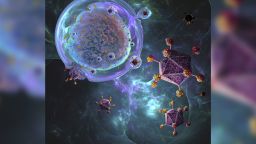Gene editing technology for treatment-resistant cancer could be a ‘scientific layup’ to treat other diseases

Great Ormond Street Hospital for Children
For the first time, a new gene editing technology called base editing was used to modify immune cells and successfully treat a teen with treatment-resistant leukemia. A month afterward, 13-year-old Alyssa was in remission, and she continues to do well several months later.
The treatment is a modification of chimeric antigen receptor, or CAR, T-cell therapy. But instead of using the CRISPR gene editing technique to modify the patient’s immune cells, the clinicians used the more precise base editing technique to alter donor immune cells.
Those edited cells are given to the patient to “rapidly find and destroy T-cells in the body, including leukemic T-cells,” according to a news release from University College London.
Dr. Otis Brawley, an oncology professor at Johns Hopkins University, told CNN that the potential of base editing could be expanded to other diseases.
Brawley, the former chief medical and scientific officer of the American Cancer Society, described the development as a “scientific layup.”
“That technology is going to help us in a lot of other diseases. For example, we’ve already used CRISPR to cure sickle cell anemia. We may very well be able to use this gene editing to even easier and better and less expensively cure sickle cell anemia,” said Brawley, who was not involved in the new research.
For now, he is cautiously optimistic and wants to see further treatments with this therapy before declaring success.
Base editing has been life-changing for Alyssa. The UK teen was diagnosed with T-cell acute lymphoblastic leukemia, or T-ALL, in 2021. Acute lymphoblastic leukemia is among the most common pediatric cancers, and T-ALL accounts for 10% to 15% of all ALL cases.
After she received chemotherapy and a bone marrow transplant, Alyssa’s cancer persisted, leaving palliative care as her only remaining option for treatment.
In May, Alyssa was admitted to the Great Ormond Street Hospital for Children in London to become the first person in the world to be infused with the base edited immune cells.
About a month after the treatment, Alyssa was in remission and received a second bone marrow transplant to restore her immune system. Six months after that transplant, Alyssa continues to do well.
Alyssa said that she had no question about whether to try the experimental therapy.
“Once I do it, people will know what they need to do, one way or another, so doing this will help people – of course I’m going to do it,” she said in a hospital news release.
The findings of Alyssa’s case were presented at the American Society of Hematology’s annual meeting, and the team at Great Ormond Street hopes to enroll at least 10 more patients to trial the therapy.
Base editing is an even more precise gene editing technique than CRISPR and has fewer risks of unwanted effects on the chromosomes and thus less risk of side effects.
Through base editing, researchers at Great Ormond Street and University College London were able to take healthy donor T-cells and remove two gene markers that prevent the modified cells from being destroyed by either the patient’s immune system or chemotherapy drugs they may be taking.
“It’s our most sophisticated cell engineering so far and paves the way for other new treatments and ultimately better futures for sick children,” said Waseem Qasim, a professor of cell and gene therapy at University College London who led the program that manufactured Alyssa’s donor cells, in a statement.
Get CNN Health's weekly newsletter
Sign up here to get The Results Are In with Dr. Sanjay Gupta every Tuesday from the CNN Health team.
“This is quite remarkable, although it is still a preliminary result, which needs to be monitored and confirmed over the next few months,” said Dr. Robert Chiesa, a consultant in bone marrow transplant and CAR T-cell therapy at Great Ormond Street, in the statement.


